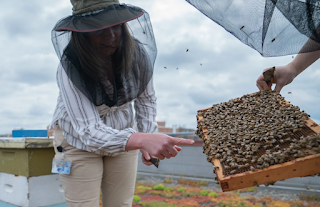Unraveling the Genetics of Altruism in Honeybees: A Queen's Legacy
Beyond Selflessness: How Queen Bees Pass Down 'Altruistic' Genes
Altruism, the selfless act of benefiting others at a personal cost, is a fascinating trait observed in humans. It is often considered uniquely human, and exploring its manifestation in animals requires a distinctive perspective. This new research delves into the genetics behind altruistic behavior in honeybees, shedding light on the intriguing world of these tiny creatures and the intricate dynamics at play.
The Mysterious World of Retinue Behavior
Worker honeybees exhibit a remarkable phenomenon known as "retinue behavior." This encompasses the caregiving actions that worker bees perform for the queen bee, such as feeding and grooming her. Specific pheromones, emitted by the queen, trigger this behavior. Importantly, worker bees are exclusively female.
Upon exposure to the queen's mandibular pheromone (QMP), worker bees undergo a transformative process. They deactivate their own ovaries and then collaborate in spreading the QMP to their fellow workers. They dedicate themselves to caring for the queen's eggs, essentially becoming 'altruistic' as they support her in producing offspring, while they themselves remain sterile.
The queen bee is typically the mother of the majority, if not all, of the hive's honeybees. Notably, the genes that influence worker bees to be more receptive to the queen's pheromone and exhibit retinue behavior can be inherited from both female and male parents. However, these genes trigger altruistic behavior only when passed down from the female bee parent.
The Battle of Genetic Influence This study supports the Kinship Theory of Intragenomic Conflict. It proposes that there is an ongoing conflict between the genes inherited from mothers and fathers regarding which behaviors to endorse or oppose. Prior research has shown that genes from males often support selfish behavior in mammals, plants, and honeybees. However, this new study uncovers a groundbreaking revelation - that females can pass down altruistic behavior through their genes to their offspring.
Worker bees usually share the same mother but have different fathers, as the queen bee mates with multiple male bees. This means that worker bees share more of their mother's genes with one another, explaining why genes from the mother tend to support altruistic behavior in honeybees. They benefit more from helping their mother and sisters, who carry a greater number of copies of the worker's genes than she could ever reproduce on her own.
Identifying Conflict Networks To delve deeper, the research team conducted crossbreeding experiments with six different honeybee lineages. While this process is relatively straightforward in mammals or plants, it presents challenges in insects. The team utilized the expertise of honeybee breeding specialists to create distinct populations.
Once the bee populations were successfully crossbred, the researchers evaluated the worker bees' responsiveness to the pheromone that triggers retinue behavior. They were able to develop personalized genomes for the parents, mapping the gene expression of the workers back to each parent to identify which parent's gene was being expressed.
The team pinpointed the gene regulatory networks responsible for intragenomic conflict. These networks contained genes linked to retinue behavior, as indicated by previous research. This discovery is a crucial step in understanding the role intragenomic conflict plays in shaping various behaviors and traits in honeybees and potentially in other species.
Paving the Way for Future Research The researchers hope that this study will serve as a blueprint for further investigations into intragenomic conflict in animals and plants. It opens new doors to explore the intricate world of genetics and altruism in the animal kingdom.
#HoneybeeGenetics, #AltruisticBehavior, #IntragenomicConflict

